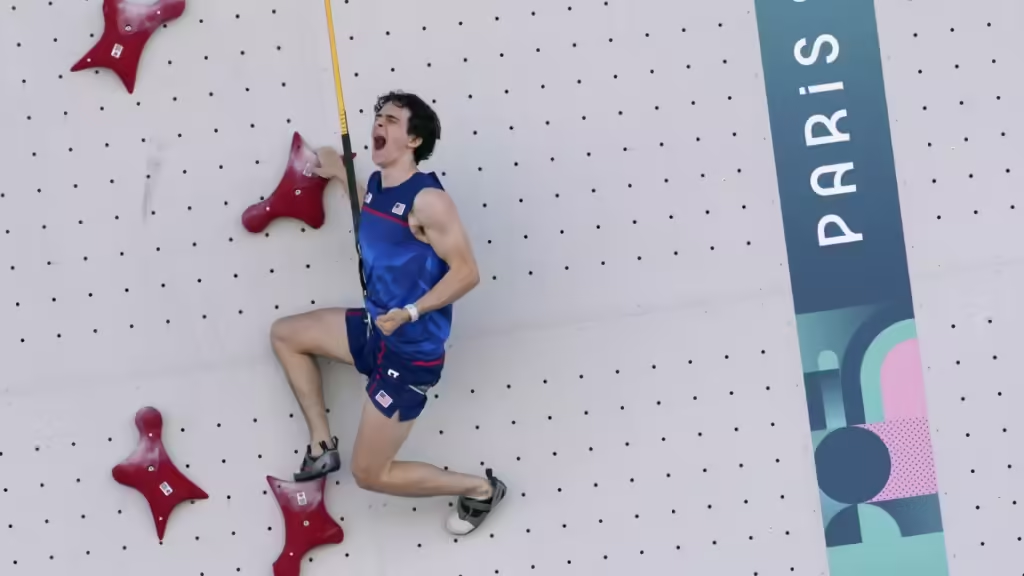Sport climbing officially became an Olympic sport at the Tokyo Games in 2021. This milestone came after the sport first appeared on the Olympic radar at the Buenos Aires Youth Olympic Games in 2018. Climbing’s inclusion, along with skateboarding and surfing, was part of an effort to broaden the program with more urban sports, aiming to attract younger audiences. Looking ahead, sport climbing will continue to be part of the program for the Los Angeles 2028 Summer Olympics.

Understanding Sport Climbing Olympics
Olympic sport climbing is divided into three distinct disciplines: bouldering, speed, and lead. Here’s a breakdown of each:
1- Bouldering:
Athletes climb a 4.5-meter wall without ropes within a limited time, aiming to reach the top in the fewest attempts possible.
2- Lead:
Climbers attempt to ascend as high as possible on a 15-meter wall within six minutes, making only one attempt.
3- Speed:
In one-on-one elimination rounds and races against the clock, climbers scale a 15-meter wall with a five-degree incline. The top male climbers can complete the ascent in under six seconds, while the best female climbers typically break seven seconds.
Sport Climbing Combined Olympics Changes Since Tokyo 2021
The 2024 Paris Olympics feature a significant change from the Tokyo Games: speed climbing has been separated into its own event, while bouldering and lead remain combined. This adjustment allows climbers to concentrate on their specialties.
The scoring system has also been revamped. During the Tokyo Games, scores from each discipline were multiplied to achieve a final score. For Paris 2024, with speed climbing as a separate event, the combined bouldering and lead disciplines will be judged out of a maximum of 200 points. Points in bouldering are awarded by advancing through various “zones” on the wall, with deductions for the number of attempts. A perfect bouldering round is worth 100 points. In lead climbing, athletes score by holding the top 40 holds, with points increasing as they climb higher. If a climber attempts the next hold but fails to secure it, they receive 0.1 points in addition to their previous score.
Sport Climbing Combined Olympics Competition Structure
In the combined bouldering and lead event, 20 men and 20 women compete. For the speed discipline, there are 14 male and 14 female competitors. Each climber participates in two speed runs on different walls, and their fastest time determines their ranking and subsequent matchups in the elimination rounds.
Top Contenders for Sport Climbing Paris 2024 Olympics
Team USA:
Sam Watson: The 18-year-old holds the men’s speed world record with a time of 4.79 seconds. Watson, who finished 2023 ranked eighth in men’s speed, won gold at the Pan American Games in Santiago.
Natalia Grossman: Ranked No. 1 in women’s boulder and fifth in the combined boulder & lead category last year, Grossman also took gold in both events at the Pan American Games.
Brooke Raboutou: She finished fifth in Tokyo and is the daughter of former climbing world cup champions Robyn Erbesfield-Raboutou and Didier Raboutou. Fluent in French, Brooke brings a rich climbing heritage to the competition.
International Athletes For Sport Climbing Combined at Paris Olympics 2024
Janja Garnbret (Slovenia): The reigning women’s gold medalist will compete in the lead/bouldering event.
Aleksandra Miroslav (Poland): A formidable contender in women’s speed climbing.
Ai Mori (Japan): A strong competitor in women’s boulder/lead.
Rahmad Adi Mulyon and Veddriq Leonardo (Indonesia): Both are strong challengers in men’s speed climbing.
Jakob Schubert (Austria): A four-time world champion and podium contender in men’s lead/bouldering.
Winner of Sport Climbing Combined Olympics 2024

Sam Watson (Team USA) breaks his own world record in speed sport climbing at the Paris Olympics with a stunning time of 4.75 seconds.

